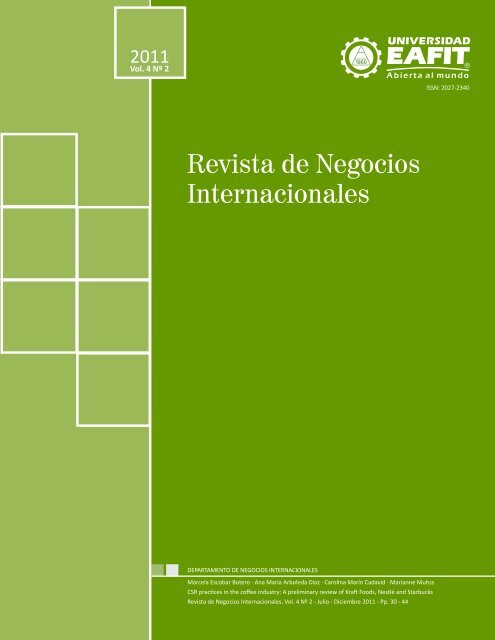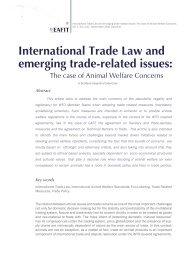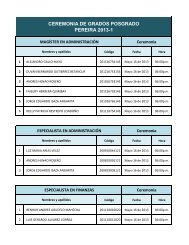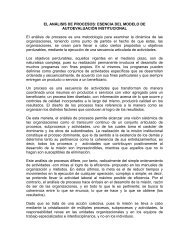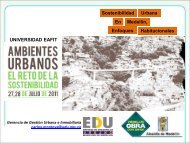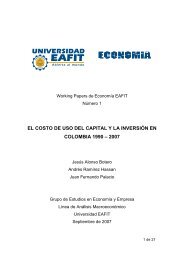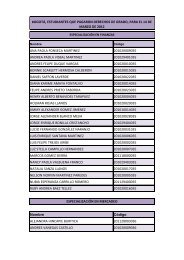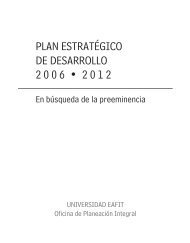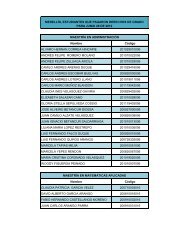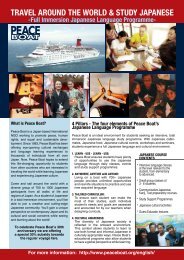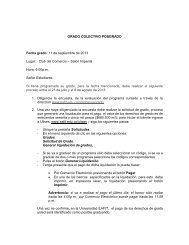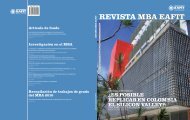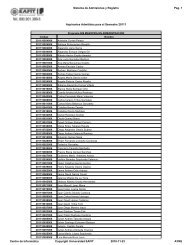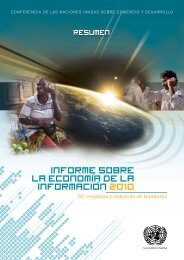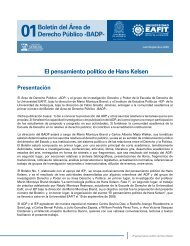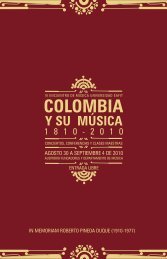Revista de Negocios Internacionales - Universidad EAFIT
Revista de Negocios Internacionales - Universidad EAFIT
Revista de Negocios Internacionales - Universidad EAFIT
You also want an ePaper? Increase the reach of your titles
YUMPU automatically turns print PDFs into web optimized ePapers that Google loves.
<strong>Revista</strong> <strong>de</strong> <strong>Negocios</strong> iNteRNacioNales<br />
vol. 4 Nº 2. Pp. 6 - 29<br />
2011<br />
Vol. 4 Nº 2<br />
29 Una tipología <strong>de</strong> competencias claves <strong>de</strong> marketing para la innovación<br />
viaRdot, eric<br />
<strong>Revista</strong> <strong>de</strong> <strong>Negocios</strong><br />
<strong>Internacionales</strong><br />
<strong>de</strong>PaRtaMeNto <strong>de</strong> <strong>Negocios</strong> iNteRNacioNales<br />
Marcela escobar Botero · ana Maria arboleda diaz · carolina Marín cadavid · Marianne Muhss<br />
CSR practices in the coffee industry: A preliminary review of Kraft Foods, Nestlé and Starbucks<br />
<strong>Revista</strong> <strong>de</strong> <strong>Negocios</strong> <strong>Internacionales</strong>. Vol. 4 Nº 2 - Julio - Diciembre 2011 - Pp. 30 - 44<br />
ISSN: 2027-2340
Marcela EscobaR botERo 1<br />
ana Maria aRbolEda dIaz 2<br />
carolina MaRíN cadavId 3<br />
Marianne Muhss 4<br />
recibido: 14/10/2011<br />
aceptado: 15/11/2011<br />
<strong>Revista</strong> <strong>de</strong> <strong>Negocios</strong> iNteRNacioNales<br />
Vol. 4 Nº 2. Pp. 30 - 44<br />
30<br />
CSR practices in the coffee industry: A preliminary review of Kraft Foods, Nestlé and Starbucks<br />
escoBaR BoteRo, Marcela · aRBoleda diaZ, ana Maria · MaRÍN cadavid, carolina, Marianne Muhss<br />
csR practices in the<br />
coffee industry:<br />
a preliminary review of Kraft Foods,<br />
Nestlé and starbucks<br />
abstract<br />
Corporate Social Responsibility (CSR) plays an important role within the coffee<br />
industry. Due to conflicts related to farmers´ exploitation, fluctuation of bean<br />
prices, growing competition in the coffee sector and the increasing superiority<br />
of the northern hemisphere, coffee producers in the <strong>de</strong>veloping countries fell<br />
into a <strong>de</strong>ep crisis. This initiated non-governmental organizations (NGOs) to put<br />
more pressure on corporations to act in a social responsible way and to support<br />
1 Marcela ESCOBAR BOTERO (mescoba6@eafit.edu.co), got a Bachelor’s <strong>de</strong>gree in Internation-<br />
al Business, with emphasis on international relations at <strong>Universidad</strong> <strong>EAFIT</strong> in Me<strong>de</strong>llin, Colombia in 2007.<br />
She is also a candidate of the International Business Masters program in the same university. Currently<br />
she is working at the logistics <strong>de</strong>partment of Solla S.A. as planner of international procurement.<br />
2 Ana Maria ARBOLEDA DIAZ (aarbole3@eafit.edu.co), received her Bachelor’s <strong>de</strong>gree of<br />
Arts in Foreign Languages from Towson University, Maryland, USA in 2009. She is also a candidate<br />
of the Masters program of International Business at <strong>Universidad</strong> <strong>EAFIT</strong>, Me<strong>de</strong>llin, Colombia and ad-<br />
ditionally a Customer Service Representative for the Latin American Region at the Tenax Corporation<br />
since 2009.<br />
3 Carolina MARÍN CADAVID Marín (cmarinc@eafit.edu.co), obtained her Bachelor’s <strong>de</strong>gree<br />
in International Business in 2007 with emphasis on International Tra<strong>de</strong> at <strong>Universidad</strong> <strong>de</strong> Me<strong>de</strong>llin,<br />
Me<strong>de</strong>llin, Colombia. She worked at the Chamber of Commerce of Me<strong>de</strong>llin as a professional in Inter-<br />
nationalization Services. She is currently studying the Master of International Business at <strong>Universidad</strong><br />
<strong>EAFIT</strong> and she is the Export Director at CI Teen Club S.A.<br />
4 Marianne Muhss (marianne.muhss@st.ovgu.<strong>de</strong>), graduated in 2007 with a Bachelor’s<br />
<strong>de</strong>gree in International Business Administration from Hochschule Rhein Main, Wiesba<strong>de</strong>n, Germany.<br />
She will obtain her Master of Science <strong>de</strong>gree in 2012 in Business Economics from Otto-von-Guericke<br />
Universität Mag<strong>de</strong>burg, Mag<strong>de</strong>burg, Germany. She worked from 2007 until 2010 for DACHSER GmbH<br />
& Co. KG, a german logistics company.
<strong>Revista</strong> <strong>de</strong> <strong>Negocios</strong> iNteRNacioNales<br />
Vol. 4 Nº 2. Pp. 30 - 44<br />
31<br />
CSR practices in the coffee industry: A preliminary review of Kraft Foods, Nestlé and Starbucks<br />
escoBaR BoteRo, Marcela · aRBoleda diaZ, ana Maria · MaRÍN cadavid, carolina, Marianne Muhss<br />
the environment and their stakehol<strong>de</strong>rs, especially the coffee farmers. The re-<br />
search question of this paper is: What have been the CSR practices of the main<br />
actors in the coffee industry until today? The present analysis offers an insight<br />
on CSR activities proposed by multinationals operating in various <strong>de</strong>veloping<br />
countries. This research closely examines the CSR approach of three leading coffee<br />
companies: Kraft Foods, Starbucks and Nestlé. The findings will illuminate<br />
similarities and differences on corporate strategy level in relation to environment<br />
and stakehol<strong>de</strong>rs.<br />
Resumen<br />
La Responsabilidad Social Corporativa (RSC) juega un papel importante en<br />
la industria <strong>de</strong>l café. En esta, se han dado conflictos relacionados con la explotación<br />
<strong>de</strong> caficultores, la fluctuación <strong>de</strong> los precios <strong>de</strong>l grano, la creciente<br />
competencia entre compañías <strong>de</strong>l sector y el dominio latente <strong>de</strong>l hemisferio<br />
norte. En conjunto, estas han sido las causas <strong>de</strong> una profunda crisis en la que<br />
cayeron principalmente los países productores <strong>de</strong> café, estos señalados como<br />
en vía <strong>de</strong> <strong>de</strong>sarrollo.<br />
Todo esto ha llevado a que diferentes organizaciones no-gubernamentales (ONG)<br />
intervengan presionando a las empresas <strong>de</strong>l café a actuar <strong>de</strong> manera socialmente<br />
responsable, apoyando especialmente a sus productores y la conservación <strong>de</strong>l<br />
medio ambiente.<br />
Este artículo preten<strong>de</strong> explorar cuales han sido las prácticas <strong>de</strong> RSC propuestas por<br />
tres <strong>de</strong> las multinacionales más representativas en la industria <strong>de</strong>l café como lo<br />
son: Kraft Foods, Starbucks y Nestlé. Esta investigación examina <strong>de</strong> cerca la RSC<br />
<strong>de</strong> estas empresas, comparando sus estrategias corporativas y certificaciones en<br />
relación con los actores y el medio <strong>de</strong> producción <strong>de</strong>l café.<br />
Key Words<br />
CSR, coffee industry, NGO, Fair Tra<strong>de</strong>, Rainforest Alliance, C.A.F.E, Common Co<strong>de</strong><br />
Introduction<br />
The dimension of CSR has increased due to globalization causing multinational<br />
companies to <strong>de</strong>al with human rights and social activities abroad, especially in<br />
countries where governments are not paying attention to these actions (Ewing &<br />
Schrage, 2004)<br />
In the coffee industry multinationals (MNCs) have been trying to display a responsible<br />
behavior as a method of improving their image and reputation (i<strong>de</strong>m). Addi-
<strong>Revista</strong> <strong>de</strong> <strong>Negocios</strong> iNteRNacioNales<br />
Vol. 4 Nº 2. Pp. 30 - 44<br />
32<br />
CSR practices in the coffee industry: A preliminary review of Kraft Foods, Nestlé and Starbucks<br />
escoBaR BoteRo, Marcela · aRBoleda diaZ, ana Maria · MaRÍN cadavid, carolina, Marianne Muhss<br />
tionally, they enhance employee conditions, generate new business opportunities<br />
and control their environmental footprint (i<strong>de</strong>m).<br />
According to Valkila, Haaparanta & Niemi (2010), the coffee production and tra<strong>de</strong><br />
are links from some of the poorest rural regions worldwi<strong>de</strong> to global markets. In<br />
terms of market share, Brazil is the number one exporting country, followed by<br />
countries such as Vietnam, Colombia, Ethiopia, India, Indonesia and other small<br />
players in the coffee market (International Coffee Organization, 2011).<br />
This papers’ research question is: What have been the CSR practices of the main<br />
actors in the coffee industry until today? The research paper will analyze the CSR<br />
activities, the practices and social as well as environmental problems surrounding<br />
the coffee industry, through the comparison of three main players: Nestlé, Kraft<br />
Foods and Starbucks. Nestlé and Kraft Foods are the largest (Kolk, 2005) and possess<br />
great experience in working together with NGOs. Starbucks is a lea<strong>de</strong>r in CSR<br />
within the coffee industry (Argenti, 2004).<br />
In the following chart, the distribution of coffee purchases can be seen, highlighting<br />
Kraft Foods, Nestlé and Starbucks to be three of the main buyer of<br />
coffee beans.<br />
Purchases by the<br />
Top 10 Coffee Roasters in 2008<br />
Own construction based on the TCC (Tropical Commodity Coalition) Report : Coffee Barom-<br />
eter 2009
<strong>Revista</strong> <strong>de</strong> <strong>Negocios</strong> iNteRNacioNales<br />
Vol. 4 Nº 2. Pp. 30 - 44<br />
33<br />
CSR practices in the coffee industry: A preliminary review of Kraft Foods, Nestlé and Starbucks<br />
escoBaR BoteRo, Marcela · aRBoleda diaZ, ana Maria · MaRÍN cadavid, carolina, Marianne Muhss<br />
literature Review<br />
To explain the reasons why corporations get involved into socially responsible behavior,<br />
Ewing and Schrage (2004) say companies want to keep their reputation<br />
and status clean by improving unsustainable production and creating new business<br />
opportunities as well as facilitating the access to certifications and licenses.<br />
The core i<strong>de</strong>a behind the CSR is to aim corporations to act and interact respecting<br />
and consi<strong>de</strong>ring the stakehol<strong>de</strong>r’s needs (Ewing & Schrage, 2004).<br />
On the other hand, the emergence of non-governmental organizations (NGOs)<br />
around the globe has been one of the most important events during the last <strong>de</strong>ca<strong>de</strong>s.<br />
One of their activities is to mediate the negotiation process between governments<br />
and multinationals (Doh & Teegen, 2002). According to Jamali & Mirshak,<br />
2007 the intervention and support of NGOs is un<strong>de</strong>niable and often used by<br />
companies to obtain effective social programs on a local level. Still un<strong>de</strong>restimated<br />
by other actors, NGOs play a major role regarding stability and sustainability<br />
of international investment projects. Some of their goals are to obtain more open<br />
and transparent procedures, fairer distribution of the economic returns, reasonable<br />
prices, employment opportunities for local labors and many more (Doh &<br />
Teegen, 2002).<br />
Besi<strong>de</strong>s getting involved in the multinational corporations bargaining process with<br />
the local governments, local NGOs can be a very valuable partner when entering<br />
markets of <strong>de</strong>veloping countries. Their knowledge about the local culture, economy,<br />
institutional and geographic features as well as business practices might facilitate<br />
market entry, minimize costs and risks and initiate new mo<strong>de</strong>ls of value<br />
creation, the community, the MNCs and the NGOs can profit from (Dahan; Doh;<br />
Oetzel & Yaziji, 2009).<br />
The coffee crisis in the 1990s, caused by overproduction and <strong>de</strong>regulation, left<br />
many farmers in poverty and <strong>de</strong>stabilized national economies largely <strong>de</strong>pending<br />
on coffee (Perez, 2007). Many NGOs started to work on the creation of a market<br />
situation offering sustainability for the workers and the environment. The solution<br />
to this crisis expected consumers and corporations from rich countries to act as<br />
global citizens (Linton, 2005).<br />
NGOs seek to influence cultural and political values of societies from <strong>de</strong>veloped<br />
countries in or<strong>de</strong>r to improve welfare of southern workers in <strong>de</strong>veloping countries.<br />
An important element they have in their programs is to promote sustainable<br />
coffee, which is produced un<strong>de</strong>r environmentally, socially and economically<br />
sustainable conditions and constitutes one of the main efforts to combine globalization<br />
and responsibility in the coffee industry. Several certifications such as<br />
Organic, Fair Tra<strong>de</strong> (FT) have emerged since the coffee crisis (Linton, 2005). Vari-
<strong>Revista</strong> <strong>de</strong> <strong>Negocios</strong> iNteRNacioNales<br />
Vol. 4 Nº 2. Pp. 30 - 44<br />
34<br />
CSR practices in the coffee industry: A preliminary review of Kraft Foods, Nestlé and Starbucks<br />
escoBaR BoteRo, Marcela · aRBoleda diaZ, ana Maria · MaRÍN cadavid, carolina, Marianne Muhss<br />
ous NGOs have created certifications and gui<strong>de</strong>lines for coffee production such as<br />
Rainforest Alliance, Smithsonian Bird Friendly, Utz Certified and the 4C Common<br />
Co<strong>de</strong>. These organizations continuously support local producers in or<strong>de</strong>r to fulfill<br />
the requirements (Kolk, 2005; SSCA, 2009). The ISO 14000 series, adopted by the<br />
International Organization for Standardization (ISO), contain international standards<br />
for environmental management. However they are not binding and strictly<br />
voluntary (Clapp, 1998). Additionally, NGOs inform and educate customers about<br />
the current issues surrounding the coffee production and the crisis as well as alternatives<br />
for the customer to be part of the solution (Linton, 2005).<br />
The Rainforest Alliance (RFA) is an internationally recognized NGO that emphasizes<br />
on the <strong>de</strong>velopment of sustainable and ethical measures to ecological issues.<br />
A certification process has been established by the RFA combining efforts to transform<br />
land-use practices, business practices and customer behavior (Rainforest Alliance,<br />
2011) . Its purpose is to create awareness on aspects such as: Ecosystem<br />
and wild life conservation, fair treatment and working conditions, community relations,<br />
integrated crop management, integrated management of waste, soil conservation,<br />
planning and monitoring, occupational health and safety (i<strong>de</strong>m). The<br />
RFA trains local auditors and makes connections between farmers, NGOs, coffee<br />
associations, and agricultural research institutions (Linton, 2005).<br />
On the other hand, the concept of Good Agricultural Practices (GAP) <strong>de</strong>scribes<br />
a set of principles that can be applied to a wi<strong>de</strong> variety of farming systems (FAO,<br />
2003). These principles emphasize aspects such as: economic and efficient production<br />
of sufficient, safe and nutritious food; sustain and enhance natural resources;<br />
maintain viable farming enterprises and contribute to sustainable livelihoods;<br />
and, meet cultural and social <strong>de</strong>mands of society (i<strong>de</strong>m).<br />
Another important certification in CSR practices is the Fair Tra<strong>de</strong> (FT) Coffee initiative.<br />
Its purpose is to purchase the coffee beans straight from growers at a higher<br />
price than the standard coffee. This license fosters, according to Argenti (2004),<br />
healthier working conditions and different economic incentives for producers. The<br />
certification is based on five principles: Fair price, <strong>de</strong>mocratic organization, direct<br />
tra<strong>de</strong> and long-term relationships, access to loans, and environmental protection<br />
(Fair Tra<strong>de</strong> USA, 2010). A condition to be certified un<strong>de</strong>r this label is to join a coffee<br />
cooperative with other local growers. They <strong>de</strong>termine how the premiums from<br />
Fair Tra<strong>de</strong> coffee will be spent (Argenti, 2004).<br />
Regarding CSR of coffee companies, Starbucks has been a pioneer to draw the<br />
starting line. In 1994, the company experienced pressured from a boycott threat<br />
by the American NGO US/LEAP (Ewing & Schrage, 2004) . The Starbucks’ co<strong>de</strong> of<br />
conduct was created in 1995 addressing issues related with fair wages, child edu-
<strong>Revista</strong> <strong>de</strong> <strong>Negocios</strong> iNteRNacioNales<br />
Vol. 4 Nº 2. Pp. 30 - 44<br />
35<br />
CSR practices in the coffee industry: A preliminary review of Kraft Foods, Nestlé and Starbucks<br />
escoBaR BoteRo, Marcela · aRBoleda diaZ, ana Maria · MaRÍN cadavid, carolina, Marianne Muhss<br />
cation rights and freedom of association with other employees (i<strong>de</strong>m). In 2000,<br />
Starbucks again un<strong>de</strong>rwent pressure from NGOs initiating purchases of FT coffee<br />
to commercialize in their shops (Kolk, 2005). One of the last and most important<br />
programs Starbucks <strong>de</strong>veloped in terms of CSR was the preferred supplier program<br />
which pays a premium for the coffee as long as it is harvested complying environmental,<br />
social, and economical criteria (Kolk, 2005). After two years of pilot<br />
programs, the C.A.F.E program (Coffee and Farmer Equity) was officially launched,<br />
giving preferences to the growers that meet the criteria mentioned above (Ewing<br />
& Schrage, 2004). The certification C.A.F.E. was officially put in place by Starbucks<br />
after that.<br />
In 2004, a public-private alliance was formed, due to an initiative by the German<br />
government to protect the Latin-American, African, and Asian agriculturists´ rights<br />
(Ewing & Schrage, 2004). The negotiation of this alliance involved producers, tra<strong>de</strong><br />
and industry actors, NGOs, unions, ICO (International Coffee Organization), and<br />
the World Bank among others (Kolk, 2005). The i<strong>de</strong>a was to <strong>de</strong>velop a co<strong>de</strong> of<br />
conduct for the coffee industry that may be aligned with the United Nation millennium<br />
goals (Ewing & Schrage, 2004). Although this co<strong>de</strong> of conduct is not mandatory,<br />
big transnational coffee companies such as Nestlé, Sara Lee, Kraft Foods and<br />
Starbucks have adhered to it (Kolk, 2005). Even though the co<strong>de</strong> does not state<br />
specific items regarding human rights, it refers to the international normative.<br />
Specific subjects are addressed by the International Labor Organization (ILO), the<br />
United Nations (UN) and the human rights <strong>de</strong>claration (Ewing & Schrage, 2004).<br />
Finally, in or<strong>de</strong>r to analyze the way companies apply different CSR practices within<br />
the coffee industry, we need to un<strong>de</strong>rstand its dynamics by comparing and contrasting<br />
several CSR approaches and CSR certification goals. This research paper<br />
intends to close the gap and focuses on the CSR practices of Starbucks, Nestlé and<br />
Kraft Foods, their similarities, differences as well as good and bad practices.<br />
Methodology<br />
This paper is a literature based research where there are analyses of existing text<br />
using both primary and secondary sources (Higson-Smith, Parle, Lange & Tothill,<br />
2000). According to this, the methodology that will be used is to search within<br />
secondary data, such as websites, statistics, reports and articles, collecting information<br />
regarding their actions and CSR practices. Based on this data, a chart will<br />
be constructed to compare some similar and differing aspects among these three<br />
companies. In the discussion, these findings will be critically assessed in or<strong>de</strong>r to<br />
i<strong>de</strong>ntify common ground obtained from the data and the literature review. The<br />
correlation between the indicators will be outlined.
<strong>Revista</strong> <strong>de</strong> <strong>Negocios</strong> iNteRNacioNales<br />
Vol. 4 Nº 2. Pp. 30 - 44<br />
36<br />
CSR practices in the coffee industry: A preliminary review of Kraft Foods, Nestlé and Starbucks<br />
escoBaR BoteRo, Marcela · aRBoleda diaZ, ana Maria · MaRÍN cadavid, carolina, Marianne Muhss<br />
Findings<br />
This section will present the results of a CSR approach analysis within the coffee<br />
industry. The cases of companies such as Nestlé, Kraft Foods and Starbucks will be<br />
compared and contrasted.<br />
The strategy that Société <strong>de</strong>s Produits Nestlé S.A., best known internationally as<br />
Nestlé, has been the creation of share value to ensure sustainable conditions for<br />
workers and the environment. It is one of many efforts that they are making in<br />
or<strong>de</strong>r to support society’s progress through a CSR plan (Kiran & Sharma, 2011),<br />
thus the company’s factories are currently located in <strong>de</strong>veloping countries. They<br />
invest in small farmers as well as in training programs to become a more profitable<br />
global business. (Porter & Kramer, 2006).<br />
Kraft Foods‘ slogan is “Creating a <strong>de</strong>licious world“ not only referring to their products<br />
but to the living conditions of all stakehol<strong>de</strong>rs. Their approach inclu<strong>de</strong>s focusing<br />
on where they can achieve the greatest difference with their global priorities in<br />
mind: food safety, health and well-being, and sustainability. Helping raise people<br />
out of poverty and hunger into a healthier life is the main social objective of Kraft<br />
Foods. Also, creating jobs, engaging in sustainable coffee production and partnering<br />
with NGOs to combine their strengths and capabilities (Kraft Foods, 2011b).<br />
Starbucks is one of the industry lea<strong>de</strong>rs regarding CSR; however most of the CSR<br />
actions they have engaged are fueled by pressures from NGOs, such as US/LEAP<br />
and Global Exchange (Kolk, 2005).<br />
ASPeCTS STARbUCKS NeSTlé KRAFT FoodS<br />
CSR programs<br />
focus area<br />
CSR actions<br />
regarding the<br />
Coffee industry<br />
• Coffee purchasing and farmer<br />
support<br />
• Community involvement<br />
• Recycling and introduction of<br />
reusable cups<br />
• Energy and water conservation<br />
• Green building (ecological<br />
construction)<br />
(Starbucks, 2010)<br />
• Buying 100% ethically<br />
produced coffee by 2015<br />
• Giving loans to farmers up to<br />
USD 20 million by 2015<br />
• Helping farmers to access the<br />
carbon market to improve<br />
their profits while taking care<br />
of the environment<br />
(Starbucks, 2010)<br />
• Water and environmental<br />
sustainability<br />
• Nutrition<br />
• Rural <strong>de</strong>velopment<br />
(Nestlé, 2011)<br />
• Sourcing for quality and<br />
sustainability<br />
• Research and <strong>de</strong>velopment for<br />
better yields.<br />
• Knowledge transfer and farm<br />
assistance<br />
• Partnerships for sustainable<br />
agriculture<br />
(Nestlé, 2006)<br />
• Health and well being<br />
• Sustainability<br />
• Food Safety and quality<br />
• Work place and culture<br />
• governance and<br />
compliance<br />
(Kraft Foods, 2011a)<br />
• Promote sustainable<br />
farming, expecting less<br />
environmental damage<br />
and higher standards of<br />
living for farmers and<br />
their families. (Kraft<br />
Foods, 2011c)
<strong>Revista</strong> <strong>de</strong> <strong>Negocios</strong> iNteRNacioNales<br />
Vol. 4 Nº 2. Pp. 30 - 44<br />
37<br />
CSR practices in the coffee industry: A preliminary review of Kraft Foods, Nestlé and Starbucks<br />
escoBaR BoteRo, Marcela · aRBoleda diaZ, ana Maria · MaRÍN cadavid, carolina, Marianne Muhss<br />
ASPeCTS STARbUCKS NeSTlé KRAFT FoodS<br />
CSR Alliances<br />
own<br />
<strong>de</strong>veloped<br />
programs<br />
Fair Tra<strong>de</strong><br />
• Conservation International<br />
• Rainforest Alliance<br />
• Common co<strong>de</strong><br />
• Transfair USA<br />
• (Linton, 2005)<br />
• Organic Farming (TCC, 2009)<br />
• C.A.F.E program: Seeks the<br />
sustainability of the coffee<br />
farmers and its communities.<br />
It focuses on five areas:<br />
product quality, economic<br />
accountability, social<br />
responsibility, environmental<br />
lea<strong>de</strong>rship in growing and<br />
processing coffee (Starbucks,<br />
2005)<br />
• In 2008, 69% of the total coffee<br />
bought by Starbucks came<br />
from the C.A.F.E program (TCC,<br />
2009)<br />
• They have bought Fair Tra<strong>de</strong><br />
labeled coffee since 2001,<br />
the yearly amount bought by<br />
Starbucks has grown steadily<br />
(Kolk, 2005; Ewing & Schrage,<br />
2004)<br />
• In 2008, 5% of the total coffee<br />
bought by Starbucks came<br />
from the Fair Tra<strong>de</strong> certified<br />
coffee (TCC, 2009)<br />
• Rainforest Alliance (Linton, 2005)<br />
• Common co<strong>de</strong> (Linton, 2005)<br />
• SAI (Sustainable Agricultural<br />
Initiative Platform): Industry<br />
level alliance with Unilever and<br />
Danone. The objective is to support<br />
agricultural <strong>de</strong>velopment worldwi<strong>de</strong><br />
(Nestlé, 2006)<br />
• saiN – the sustainable agriculture<br />
Initiative Nestlé: program to support<br />
farmers and producers to increase<br />
productivity by giving them access<br />
to experts and the latest agrotecnology.<br />
(Nestlé, 2006)<br />
• Nescafé Plan, to support good<br />
farming practices in the coffee<br />
supply chain and eliminates<br />
mediation (Nestlé, 2010b)<br />
• The Partners’ Blend program<br />
supports farmers to establish higher<br />
quality coffee, diversify the genetics<br />
of their crops and achieve a higher<br />
standard of living<br />
( Nestlé, 2006 )<br />
• Nestlé is certificated in the<br />
international Fair tra<strong>de</strong> standards,<br />
including the payment of Fair tra<strong>de</strong><br />
minimum prices and social premiums<br />
to the farmers’ organizations (Nestlé,<br />
2006)<br />
• In 2008, 0.26% of the total coffee<br />
bought by Nestlé came from the Fair<br />
Tra<strong>de</strong> certified coffee (TCC, 2009)<br />
• Rain Forest Alliance (RA)<br />
• Deutsche Gesellschaft<br />
für technische<br />
Zusammenarbeit (GTZ)<br />
• United States Agency<br />
for International<br />
Development (USAID)<br />
(CSR WeltWeit, 2009)<br />
They do not have any self<strong>de</strong>veloped<br />
program.<br />
• Largest buyer of cocoa<br />
beans, no information<br />
on coffee beans (Kraft<br />
Foods, 2011b)
<strong>Revista</strong> <strong>de</strong> <strong>Negocios</strong> iNteRNacioNales<br />
Vol. 4 Nº 2. Pp. 30 - 44<br />
38<br />
CSR practices in the coffee industry: A preliminary review of Kraft Foods, Nestlé and Starbucks<br />
escoBaR BoteRo, Marcela · aRBoleda diaZ, ana Maria · MaRÍN cadavid, carolina, Marianne Muhss<br />
ASPeCTS STARbUCKS NeSTlé KRAFT FoodS<br />
RainForest<br />
Alliance (RA)<br />
Common Co<strong>de</strong><br />
(4C)<br />
CSR major<br />
scandals<br />
• Starbucks is part of the<br />
Rainforest Alliance (Linton,<br />
2005)<br />
• Starbucks did not buy any<br />
Rainforest Alliance certified<br />
coffee in 2008 (TCC, 2009)<br />
• Starbucks is part of the<br />
Common Co<strong>de</strong> (Linton, 2005)<br />
• Starbucks did not buy any<br />
Common Co<strong>de</strong> certified coffee<br />
in 2008 (TCC, 2009)<br />
• US/LEAP boycott fighting for<br />
Guatemalan coffee farmers<br />
human right<br />
• Global exchange threat to<br />
boycott their stores in or<strong>de</strong>r<br />
to make Starbucks buy and<br />
commercialize Fair Tra<strong>de</strong><br />
coffee<br />
All of these scandals en<strong>de</strong>d up in<br />
CSR actions by Starbucks.<br />
(Kolk, 2005; Ewing & Schrage,<br />
2004)<br />
• Nestlé is part of the rainforest<br />
alliance.<br />
• They had created together the<br />
Nespresso AAA sustainable Quality<br />
Program to ensure quality and<br />
sustainability requirements<br />
• (Nestlé, 2010a; Nestlé 2010b)<br />
• In 2008, 1.67% of the total coffee<br />
bought by Nestlé came from the<br />
Nespresso AAA coffee (TCC, 2009)<br />
• Nestlé is part of the Common Co<strong>de</strong><br />
and expects that in 2015 all its<br />
supplier should meet common co<strong>de</strong><br />
standards (Nestlé, 2006; Nestlé<br />
2010b)<br />
• In 2008, 0.77% of the total coffee<br />
bought by Nestlé was Common Co<strong>de</strong><br />
certified coffee (TCC, 2009)<br />
• Nestlé boycott by NGO War on Want<br />
in 1974, INFACT (Infant Formula<br />
Action Coalition) in 1977. This<br />
boycott pressured Nestlé to adopt<br />
international co<strong>de</strong>s (Baker, 1985).<br />
According to Kolk (2005) this boycott<br />
permeated all CSR actions engaged<br />
by Nestlé.<br />
• Since 2003 (leading<br />
purchaser of RA<br />
certified coffee) the<br />
yearly amount bought<br />
by Kraft Foods has<br />
grown steadily (CSR<br />
WeltWeit 2009; Kraft<br />
Foods, 2011a)<br />
• In 2008, 3.99% of the<br />
total coffee bought by<br />
Kraft Foods came from<br />
the RA coffee (TCC,<br />
2009)<br />
• One of the foun<strong>de</strong>rs<br />
(Kraft Foods, 2011c; CSR<br />
WeltWeit, 2009)<br />
• In 2008, 0.14% of the<br />
total coffee bought by<br />
Kraft Foods was the 4C<br />
coffee (TCC, 2009)<br />
• Kraft Foods has<br />
presented 2<br />
environmental cases<br />
that have provoked its<br />
inclusion in CSR: An air<br />
free of ozone-<strong>de</strong>pleting<br />
refrigerant affecting<br />
the layer of ozone and<br />
the other case involves<br />
a release of oil which<br />
contaminated the river<br />
(GreenEnvironment,<br />
2006)<br />
As the chart shows, all three companies are active in CSR. It is important to clarify<br />
that Starbucks is only in the coffee industry; meanwhile Nestlé and Kraft Foods<br />
are in the food industry. When analyzing each CRS approach, Starbucks and Nestlé<br />
have a direct line of action related to the coffee supply chain; instead Kraft Foods<br />
does not have a specific CSR line to attack directly the <strong>de</strong>ficiencies of human and<br />
environmental rights within the coffee industry. Agricultural product’s supply<br />
chain is within the sustainability line of Kraft Foods’ CSR. Also, the actions within<br />
the coffee industry are well <strong>de</strong>fined and measured especially in the Starbuck’s reports.<br />
Nestlé is not as concrete as Starbucks, however, they have well <strong>de</strong>fined ac-
<strong>Revista</strong> <strong>de</strong> <strong>Negocios</strong> iNteRNacioNales<br />
Vol. 4 Nº 2. Pp. 30 - 44<br />
39<br />
CSR practices in the coffee industry: A preliminary review of Kraft Foods, Nestlé and Starbucks<br />
escoBaR BoteRo, Marcela · aRBoleda diaZ, ana Maria · MaRÍN cadavid, carolina, Marianne Muhss<br />
tions but they are not clear enough about when they expect to fulfill these goals.<br />
For Kraft Foods, the most visible objective is to be the biggest buyer of RainForest<br />
Alliance certified coffee (Kraft Foods, 2011c).<br />
In addition, it is important to illustrate that in 2008, 76.5% of Starbucks coffee purchases<br />
were ma<strong>de</strong> from C.A.F.E, Fair Tra<strong>de</strong> or Organic Farming certified products,<br />
while Kraft Foods only bought 4.1% certified coffee beans out of the company’s total<br />
coffee purchase, most of the beans being RA coffee. Lastly Nestlé only bought<br />
2.7% of the total purchases from certified coffee supply (Nespresso, Fair Tra<strong>de</strong> and<br />
4C certifications) (TCC, 2009).<br />
When reviewing CSR alliances, an important fact must be highlighted. Nestlé is the<br />
only one that has engaged in an industry level program regarding the agricultural<br />
industry. According to self-<strong>de</strong>veloped programs, Starbucks and Nestlé have been<br />
active <strong>de</strong>veloping programs to improve the conditions of the coffee supply chain.<br />
Kraft Foods has not had any self-<strong>de</strong>veloped program. The three companies are<br />
active in the Rainforest Alliance and 4C, however, only Nestlé and Starbucks are<br />
related to Fair Tra<strong>de</strong> in the coffee industry.<br />
discussion<br />
As explained in the literature review the role of NGOs as active player in CSR has become<br />
a major issue. They are powerful enough to make changes in the status quo of<br />
a situation. For example US/LEAP pressured Starbucks to adopt a co<strong>de</strong> of conduct,<br />
the first time an American multinational corporation did it in the agricultural industry<br />
(Ewing & Schrage, 2004). Also, War on Want and INFACT lead Nestlé to adopt a<br />
co<strong>de</strong> and stopped publicity about how formula milk could completely replace breast<br />
feeding (Baker, 1985). Moreover, this Nestlé boycott had a <strong>de</strong>ep impact on the company’s<br />
CSR, granting special importance to the international legal laws (Kolk, 2005).<br />
However, in spite of the power held by NGOs, and the continuous <strong>de</strong>mands towards<br />
transnational coffee companies, there are still some bad practices occurring and<br />
harming the coffee growers. For instance, according to Argenti (2004), small producers<br />
still have issues with financing their operations throughout the year and selling<br />
their crop prior to harvest for a cash advance to tra<strong>de</strong>rs. The high interest rates<br />
charged on these credits result in a continuing poverty spread. Additionally, as a<br />
commodity product, coffee prices vary greatly according to the supply and <strong>de</strong>mand.<br />
Small farmers are always at risk of shortage and overproduction in the harvesting<br />
process thus the return on investment is not homogenous (i<strong>de</strong>m).<br />
Furthermore, Muradian and Pelupessy (2005) argue that some voluntary certification<br />
schemes embrace weaker selection criteria and thus provi<strong>de</strong> opportunities<br />
for large companies to “green wash” their image. Regarding the welfare effects of
<strong>Revista</strong> <strong>de</strong> <strong>Negocios</strong> iNteRNacioNales<br />
Vol. 4 Nº 2. Pp. 30 - 44<br />
40<br />
CSR practices in the coffee industry: A preliminary review of Kraft Foods, Nestlé and Starbucks<br />
escoBaR BoteRo, Marcela · aRBoleda diaZ, ana Maria · MaRÍN cadavid, carolina, Marianne Muhss<br />
the CP and RFA certifications, these are most likely to be given to highly educated<br />
and somewhat small size farm families. While the income received by the conventional<br />
FT households is relatively high, the income by RFA producers is consi<strong>de</strong>rably<br />
low (Ruben & Zuniga, 2011).<br />
After reviewing the CSR actions engaged by these three companies, it is evi<strong>de</strong>nt<br />
that most of the time they take on CSR actions, it is because a threat of boycott<br />
or an actual boycott is hold against them. Starbucks <strong>de</strong>veloped most of its CSR<br />
programs, as said before, because of NGO pressures. The same happened with<br />
Nestlé. By studying these two companies we can say that they have had a responsive<br />
CSR. However, it is clear that Starbucks has adopted greater compromises<br />
than Nestlé and Kraft Foods. This is very obvious when comparing the amount<br />
of certified coffee each company bought in 2008. Furthermore, the fact must be<br />
taken into account that Starbucks is within the fine coffee segment (Kolk, 2005),<br />
which allows them to charge higher prices to consumers; meanwhile Nestlé and<br />
Kraft Foods are within a different segment and competes mostly with various<br />
brands in the supermarket, in a less differentiated product environment (I<strong>de</strong>m). It<br />
can be stated that the pressures by the NGOs has resulted in a more compromised<br />
CSR behavior by Starbucks than by the other two companies.<br />
conclusion<br />
The coffee industry has un<strong>de</strong>rgone major changes and challenges during the last<br />
twenty years. The supply and <strong>de</strong>mand of certified coffees and sustainability standards<br />
have been the result of NGOs pressure and corporation’s responsive actions.<br />
Throughout the analysis, the rather reactive than active corporate approach<br />
by preventing scandals and seeking image gain through CSR practices, such as the<br />
increased purchase of certified coffee beans, became evi<strong>de</strong>nt.<br />
Nestlé and Starbucks have chosen to use different standard systems in alliance<br />
with different NGOs to advertise sustainability in their own premium product<br />
lines. Kraft Foods is promoting Rainforest Alliance coffee, while Nestlé, who <strong>de</strong>veloped<br />
its own program for a very specific high quality premium coffee, is the<br />
main buyer of 4C compliant coffee. Both companies are <strong>de</strong>veloping a CSR-policy<br />
specifically focused on procuring more sustainable coffee on a yearly basis. However,<br />
Starbucks is the only company that buys large quantities of coffee, certified<br />
by C.A.F.E Practices, Fairtra<strong>de</strong> and/or Organic, and has set a clear goal of 100%<br />
sustainable coffee, by 2015.<br />
In spite of all the voluntary and involuntary efforts by companies in the coffee<br />
industry there remains a lot to be done regarding welfare and environmental protection<br />
as well as economical and social equality within the sector.
<strong>Revista</strong> <strong>de</strong> <strong>Negocios</strong> iNteRNacioNales<br />
Vol. 4 Nº 2. Pp. 30 - 44<br />
41<br />
CSR practices in the coffee industry: A preliminary review of Kraft Foods, Nestlé and Starbucks<br />
escoBaR BoteRo, Marcela · aRBoleda diaZ, ana Maria · MaRÍN cadavid, carolina, Marianne Muhss<br />
bibliography<br />
Argenti, P. 2004. Collaborating with activists: How Starbucks works with NGOs.<br />
California Management Review, 47(1): 91-116.<br />
Baker J.C. 1985. The International Infant Formula Controversy: A Dilemma in Cor-<br />
porate Social Responsibility. Journal of Business Ethics, 4(3): 181-190.<br />
Clapp, Jennifer (1998). The Privatization of Global Environmental Governance: ISO<br />
14000 and the Developing world. Global Governance, 4: 295-316.<br />
CSR WeltWeit. 2009. Kraft Foods Deutschland GmbH - Nachhaltiger Kaffeeanbau<br />
in Kooperation mit <strong>de</strong>r Rainforest Alliance. http://www.csr-weltweit.<strong>de</strong>/fallstudien/studie/kraft-foods-<strong>de</strong>utschland-gmbh-nachhaltiger-kaffeeanbau-in-kooperation-mit-<strong>de</strong>r-rainforest-alliance/<br />
in<strong>de</strong>x.nc.html. Accessed on: October 29, 2011<br />
Dahan, N., Doh, J., Oetzel, J., & Yaziji, M. 2009. Corporate-NGO Collaboration: Co-creat-<br />
ing New Business Mo<strong>de</strong>ls for Developing Markets. Long Range Plannin,g 43: 326-342.<br />
Doh, J., & Teegen, H. 2002. Nongovernmental organizations as institutional actors<br />
in international business: theory and implications. International Business Review,<br />
11: 665-684.<br />
Ewing, A. P., & Schrage, E. J. 2004. El sector empresarial y los <strong>de</strong>rechos humanos :<br />
¿pue<strong>de</strong> el sector privado contribuir a promover los <strong>de</strong>rechos humanos en el sector<br />
cafetalero? <strong>Revista</strong> IIDH, 39: 293-334.<br />
Fair Tra<strong>de</strong> USA. 2010. What is Fair Tra<strong>de</strong>? http://www.transfairusa.org. Accessed<br />
on: October 29, 2011.<br />
FAO. 2003. Development of a Framework for Good Agricultural Practices. http://www.<br />
fao.org/DOCREP/MEETING/006/Y8704e.HTM. Accessed on: November 01, 2011.<br />
GreenEnvironment. 2006. Kraft Foods Resolves 2 Environmental Cases By Agreeing<br />
to Pay Penalties and Perform Environmental Plan at Woburn, Massachusetts Facility<br />
http://www.greenenvironmentnews.com/Environment/Air/Kraft+Foods+Resolv<br />
es+2+Environmental+Cases+By+Agreeing+to+Pay+Penalties+and+Perform+Envi<br />
ronmental+Plan+at+Woburn,+Massachusetts+Facility. Accessed on: November<br />
01, 2011.
<strong>Revista</strong> <strong>de</strong> <strong>Negocios</strong> iNteRNacioNales<br />
Vol. 4 Nº 2. Pp. 30 - 44<br />
42<br />
CSR practices in the coffee industry: A preliminary review of Kraft Foods, Nestlé and Starbucks<br />
escoBaR BoteRo, Marcela · aRBoleda diaZ, ana Maria · MaRÍN cadavid, carolina, Marianne Muhss<br />
Higson-Smith, C., Parle, J., Lange L., & Tothill, A. 2000. Writing your research proposal:<br />
A workbook for first time and inexperienced researchers in the social sciences<br />
and humanities. http://www.nrf.ac.za/yenza/zip/proposal.zip. Accessed on:<br />
November 01, 2011.<br />
Jamali, D. & Mirshak, R. 2007. Corporate Social Responsibility (CSR): Theory and Practice<br />
in a Developing Country Context. Journal of Business Ethics, 72(3): 243-262.<br />
Kiran, R. & Sharma, A. 2011. Corporate Social Responsibility: A Corporate Strategy for<br />
New Business Opportunities. Journal of international Business Ethics, 4(1): 10-17.<br />
Kolk, A. 2005. Corporate Social Responsibility in the Coffee Sector: The Dynamics<br />
of MNC Responses and Co<strong>de</strong> Development. European Management Journal,<br />
23(2): 228-236.<br />
Kraft Foods. 2011a. Geschmack für nachhaltig angebauten Kaffee entwickeln.<br />
http://<strong>de</strong>eu.kraftfoodscompany.com/KFE/Responsibility/sustainability/coffee.<br />
aspx. Accessed on: October 29, 2011.<br />
Kraft Foods. 2011b. Creating a more <strong>de</strong>licious world: Our 2010 report. http://<br />
www.kraftfoodscompany.com/SiteCollectionDocuments/pdf/kraftfoods_<strong>de</strong>liciousworld.pdf.<br />
Accessed on: October 29, 2011.<br />
Kraft Foods. 2011c. Delicious world. http://www.kraftfoodscompany.com/Deli-<br />
ciousWorld/sustainability/Pages/coffee.aspx. Accessed on: October 30, 2011<br />
Linton, A. 2005. Partnering for sustainability: Business- NGO alliances in the coffee<br />
industry. Development in Practice, 1 5(3 & 4): 600-614.<br />
Muradian, R. & Pelupessy, W. 2005. Governing the coffee chain: the role of voluntary<br />
regulatory systems, World Development, 33(12): 2029-44.<br />
Nestlé. 2006. The Nestlé concept of Corporate Social Responsibility: As implemented<br />
in Latin America. http://www.nestle.com/Common/NestleDocuments/<br />
Documents/Reports/CSV%20reports/Specific%20regions/Concept_CSR_LA-<br />
TAM_2005_English.pdf. Accessed on: October 27, 2011<br />
Nestlé. 2010a. Creating shared value update. http://www.nestle.com/Common/<br />
NestleDocuments/Documents/Library/Documents/Corporate_Social_Responsi-
<strong>Revista</strong> <strong>de</strong> <strong>Negocios</strong> iNteRNacioNales<br />
Vol. 4 Nº 2. Pp. 30 - 44<br />
43<br />
CSR practices in the coffee industry: A preliminary review of Kraft Foods, Nestlé and Starbucks<br />
escoBaR BoteRo, Marcela · aRBoleda diaZ, ana Maria · MaRÍN cadavid, carolina, Marianne Muhss<br />
bility/Nestle_Creating_Shared_Value_Update_2010.pdf. Accessed on: October<br />
27, 2011<br />
Nestlé. 2010b. Nestlé creating shared value and rural <strong>de</strong>velopment report 2010.<br />
http://www.nestle.com/Common/NestleDocuments/Documents/Library/Documents/Corporate_Social_Responsibility/2010-RD-Report.pdf.<br />
Accessed on: October<br />
30, 2011<br />
Nestlé. 2011. Creating shared value. http://www.nestle.com/CSV/Pages/CSV.aspx.<br />
Accessed on: October 30, 2011<br />
Pay, E. 2009. The market for organic and Fair Tra<strong>de</strong> coffee. http://www.fao.org/<br />
fileadmin/templates/ organicexports/docs/Market_Organic_FT_Coffee.pdf Accessed<br />
on: November 01, 2011.<br />
Perez, P. 2007. Las transformaciones institucionales en la producción y comercial-<br />
ización internacional <strong>de</strong>l café en los siglos XX e inicios <strong>de</strong>l siglo XXI. <strong>Revista</strong> Latino-<br />
americana <strong>de</strong> economía, 38(150): 108-132.<br />
Porter, M. & Kramer, M. 2006. Strategy & Society: The Link between competitive<br />
advantage and corporate social responsibility. Harvard Business Review, 1-16.<br />
Rainforest Alliance. 2011. About Us. http://www.rainforest-alliance.org/newsroom/experts/tensie-whelan.<br />
Accessed on: October 29, 2011.<br />
Ruben, R. & Zuniga, G. 2011. How standards compete: comparative impact of cof-<br />
fee certification schemes in Northern Nicaragua. Supply Chain Management: An<br />
International Journal, 16(2): 98-109.<br />
SSCA Sustainability Committee 2009. Sustainable Coffee Certifications – A Comparison<br />
Matrix. http://www.scaa.org/PDF/SustainableCoffeeCertificationsComparisonMatrix.pdf.<br />
Accessed on: November 01, 2011.<br />
Starbucks. 2005. Striking a Balance - Corporate Social Responsability 2004 Annual<br />
Report. http://www.starbucks.com/assets/csr-fy04-ar.pdf. Accessed on: October<br />
29, 2011.<br />
Starbucks. 2010. Goals and progress 2010. http://www.starbucks.com/responsi-<br />
bility/learn-more/goals-and-progress. Accessed on: October 29, 2011.
44<br />
2011<br />
Vol. 4 Nº 2<br />
<strong>Revista</strong> <strong>de</strong> <strong>Negocios</strong> iNteRNacioNales<br />
Vol. 4 Nº 2. Pp. 30 - 44<br />
CSR practices in the coffee industry: A preliminary review of Kraft Foods, Nestlé and Starbucks<br />
escoBaR BoteRo, Marcela · aRBoleda diaZ, ana Maria · MaRÍN cadavid, carolina, Marianne Muhss<br />
<strong>Revista</strong> <strong>de</strong> <strong>Negocios</strong><br />
<strong>Internacionales</strong><br />
<strong>de</strong>PaRtaMeNto <strong>de</strong> <strong>Negocios</strong> iNteRNacioNales<br />
Alexan<strong>de</strong>r Zehn<strong>de</strong>r · Brenton Maurielle · Juan David Duque Arrendondo · Sandra Milena Ospina D’allemanThe CSR<br />
aspects of the Energy Generating Industry<br />
<strong>Revista</strong> <strong>de</strong> <strong>Negocios</strong> <strong>Internacionales</strong>. Vol. 4 Nº 2 - Julio - Diciembre 2011 - Pp. 45 - 57


